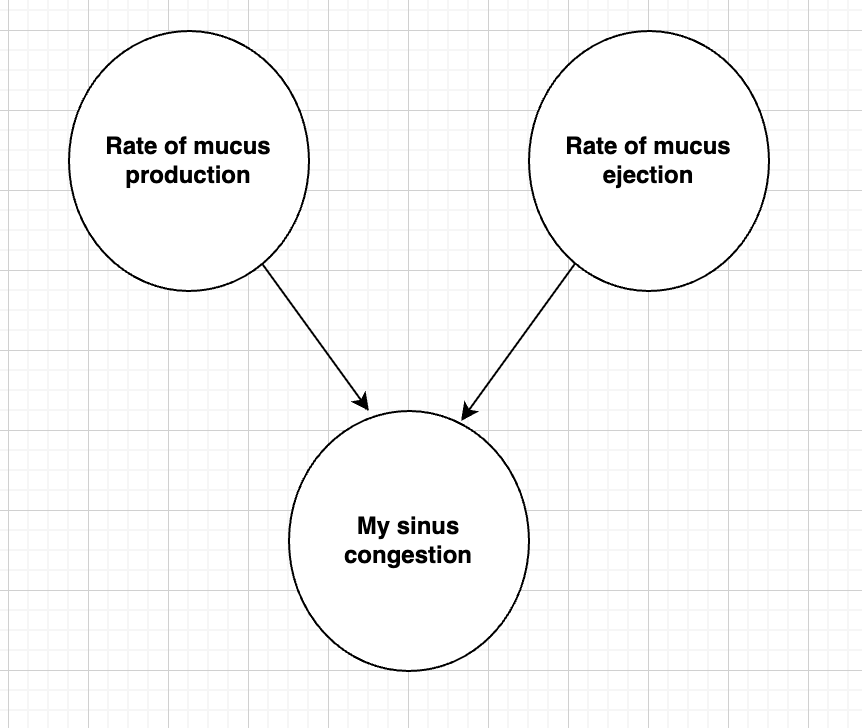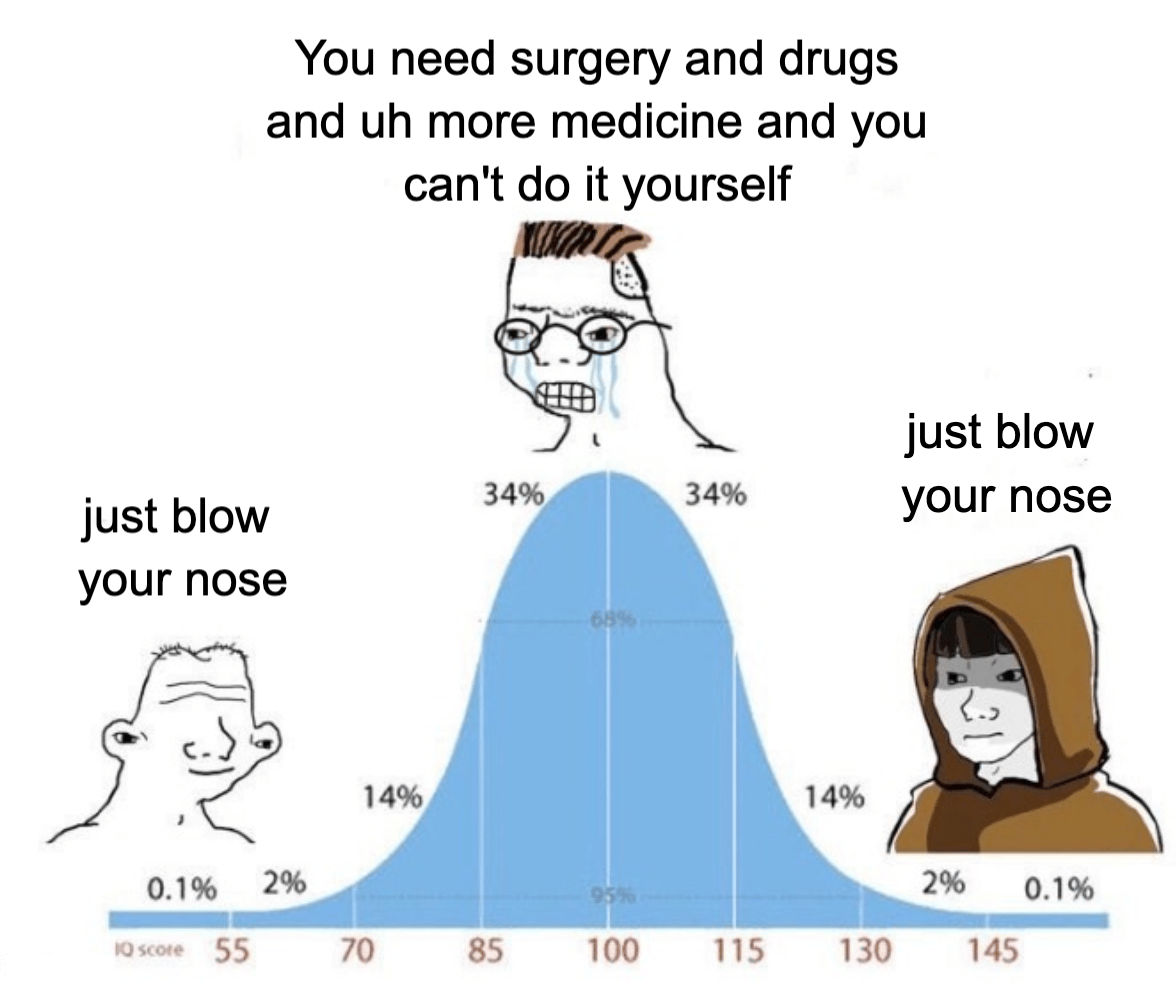- Noah Jacobs Blog
- Posts
- On Skepticism
On Skepticism
How skepticism saved me from a surgery I didn’t need.
2025.06.01
CII
[Only an Expert, Do No Harm, Occam's Razor Cured Me, 55 Million Lines of Code, Buried Complexity, The Skeptic Thrives]
Thesis: Skepticism is your greatest weapon against creeping complexity, especially when that complexity gets buried.
[Only an Expert]
About two months ago, I was diagnosed with chronic sinusitis and was told that the only way to remedy it was with surgery. That surgery would not only involve cleaning out my sinuses, it would also include the widening of passage ways. See original post here.
Last week, I went to another ENT. After examination and review of my original CT Scan, he declared that I no longer had any infection and did not need surgery.
Yes, that is right. A doctor asserted that the only way for me to remedy an issue was with a surgery. He even told me horror stories about how I would be “limping on” with no relief until I got the surgery. Two months later, I had remedied the issue without surgery.
If I had not been skeptical enough to take the opposite stance that the educated professional was taken, I would have gotten a surgery that I absolutely did not need.
Asides from personally motivated righteous indignation, I am now plagued by some questions: How many people would have gotten the surgery because the doctor told them to? Under what conditions would I have gotten the surgery?
I don’t have the answers, but I am exploring the why–I think this sort of interaction is symptomatic of a society that in many ways, runs on inertia &, as Jonathan Blow claims, replaces deep understanding & knowledge with mere trivia.
Your best weapon of personal defense and triumph among such a mess is skepticism.
Here’s why.
[Do No Harm]
To review, after two appointments, a course of antibiotics, and a CT Scan, the first ENT came to the conclusion that my sinus issues were bad enough that the only way forward was surgery.
When I asked what was wrong with me, he literally said, “It’s too complex to know, and even if we did know, there wouldn’t be anything we could do about it.”
There was an utter lack of desire to actually understand what was going on—he was more or less collecting a predetermined set of facts to put into his model to get an answer. The only outputs possible were inaction, medication, or surgery.
To make matters worse, the second ENT I saw was no better. He observed that I was completely fine, and then proceeded to prescribe me 3 allergy medications that I won’t be taking.
I asked him a number of times why he would do that if I was fine, and he simply said, “You don’t know, you might feel even better.” Each time he gave the response, he was more defensive than the last.
It felt that both doctors ignored me and my concerns and more or less programmatically made their decisions based on some rules and levels of facts that excited a layer above reality.
They doctors relied on things that they “knew” and were supposed to model reality. But, they made the trade off that we all make without realizing it–they traded the complexity of the real world for what was supposed to be a simpler model that actually creates entirely new complexities, including unneeded medications & surgeries with undersold second order consequences.
[Occam's Razor Cured Me]
So, what did I do instead of accepting the doctor’s model?
I more or less conceptualized the problem as a very simple causal diagram. Then, I attempted to reduce the amount of mucus being produced and increase the amount of mucus being ejected.

The two factors going into my congestion are how much mucus I produce and how much I get rid. Control those and you control the congestion.
Very simple, right? When it came to actually altering the variables, here are what I think the highest impact actions were:
No Allergens in Bed - Reduce Production - Allergies were a known driver for my issues, and I go outside everyday. So, I now shower (or even just rinse off) every night to remove allergens from my body before I got into bed. And, if I want a quick 20 minute midday nap, I’ll take it on the floor.
Steaming - Increase Ejection - I’ve been sitting in the shower with scalding hot water coming from the shower head so I can create a steamy environment to clear my sinuses. Eucalyptus included.
Breathing & Cardio - Increase Ejection - I started doing a lot more slow, zone 2 cardio with a focus on breathing in deeply through my nose. Like steaming, this helps me spit out mucus or blow it out from my nose.
Other factors include a 72 hour fast to reduce inflammation, spicier food, ginger shots, slight improvements to diet, enjoying better weather and getting more sun.
And, keep in mind, while I had the tailwind of better weather, I also had the headwind of more allergies & pollen.
None of this is to say that I definitely know what cured me, but it seems to be very logical, plausible, and straightforward routes.
The ENT more or less operated a number of layers above these levers. For him, all that mattered were route medical facts and things he could control. Every time you add a model between you and the world, the more unneeded complexity it introduces.

[55 Million Lines of Code]
It is wrong to think that fetishizing complexity is an aberration strictly limited to the medical field.
If anything, it’s one of the defining sins of our time. And, it’s most insidious when the complexity operates under the guise of simplicity.
It is very simple for me to write this blog post and send it to you. However, it takes at least 55 Million lines of code to read a text file, so it likely takes at least that many for you to read this text where ever you are.
That is dangerous. There are more or less 55 million assumptions between me sending my blog and you receiving it.
It’s “more simple” for a doctor with a degree to use his diagnostic model to come up with one of a limited number of solutions than it is for him to intensely and curiously interrogate my actual condition. Likewise, it’s more simple for me to send out a blog.
But, both things come at the cost of buried complexity. Sometimes, that is okay. Other times, it is not.
[Buried Complexity]
Python is a programming language that is pretty “abstract.” This means that you can write in it without knowing a lot about what the program is telling to the different parts of the computer. You don’t need to know when & how it is storing things.
This is great—it makes programming simpler!
It is also bad, because it creates a lot of inefficiencies and complexities that get buried.
Here are two pieces of code that “do the same thing”:
even_list = []
for item in generic_list:
if item % 2 == 0:
even_list.append(item)even_list = [item for item in generic_list if item % 2 == 0]However, if you run both pieces of code on a list of even 8,000 elements, the first piece of code will make a list that uses almost 10% more memory and will be slower!*
While a lot of developers I’ve spoken to have no idea this difference exists, if you want really performant Python code, it helps a lot to know this. So, while Python makes it “easier” and simpler to write code, it also buries complexity in the forms of trade offs someone else made.
The trouble is, to even know these trade offs exist, you have to be curious and skeptic enough to not take the first “obviously correct” code at face value! And, to boot, I’m sure there are dozens or hundreds of other similar efficiency gains that I don’t know about.
Just like you should be very skeptical when a doctor uses a bunch of his pre existing assumptions to make it easier to diagnose you, you have to keep aggressively going deeper and deeper below the unnecessary complexity to know what’s actually going on in the world.
*See High Performance Python by Gorelick and Ozsvald, or profile the code yourself.
[The Skeptic Thrives]
The more curious and engaged with the world, the better off you are.
Sure, maybe sometimes, the difference between a piece of python code that “works” and something that works well “doesn’t matter.” But if it never matters across the 55 million lines between me and you reading this, then we end up with a windows distribution that sucks and a chrome browser that hogs 2GB of memory to doom scroll instagram.
And, when the same trade offs that “don’t matter” are made medically, you end up with a doctor telling an otherwise healthy 24 year old male that he needs surgery when he just needs to really make a focused effort to clear his sinuses.
Burying complexity under the guise of making things simpler does not just happen in code or medicine. It happens all over the place. Given the current trajectory of just trusting generative ai in it’s current state, it will only get worse.
It is more and more critical to make an effort to conceptualize as much as possible what is actually going on and get down as close as possible to reality.
It’s troubling that it has to be this way, but skepticism of the surface level systems and conclusions might be the only thing between you and letting a doctor cut holes in your face.
Live Deeply,
